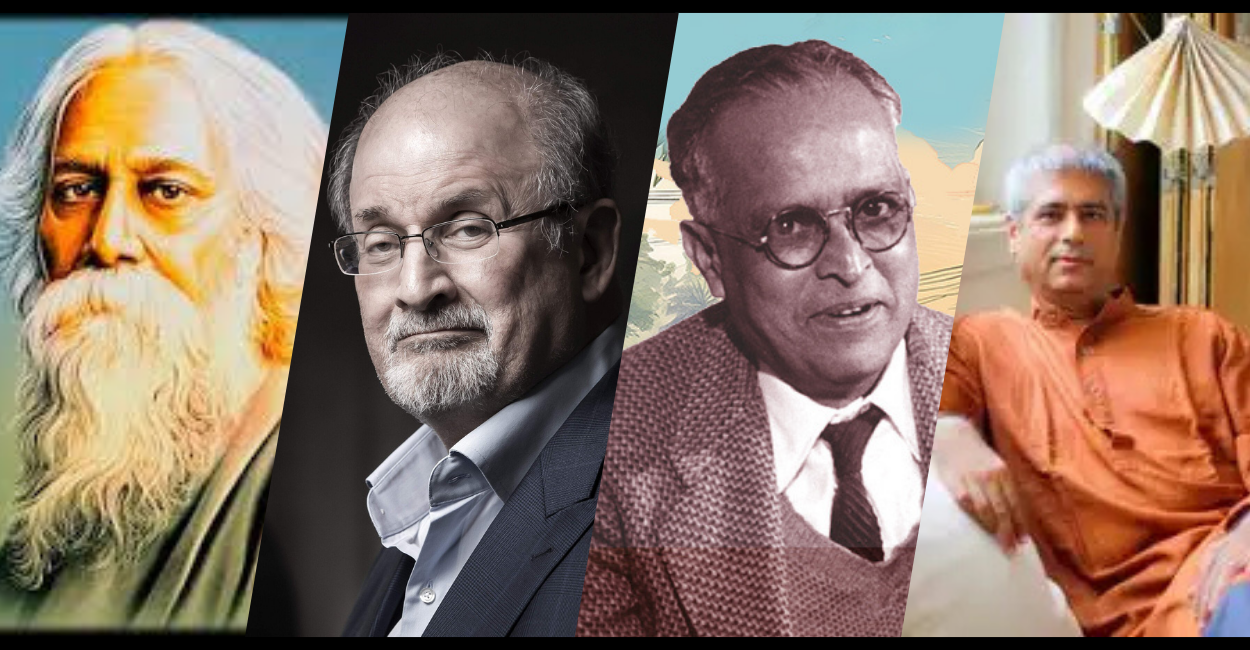Indian English literature has given the world some of the most famous Indian authors, the best Indian novelists, and award-winning Indian writers whose works continue to shape modern Indian literature. From poetry to novels, plays to short stories, these voices capture the richness of India’s culture and history while inspiring readers across generations.
Rabindranath Tagore
I’ll admit — when I first opened Gitanjali in school, I was a bit lost. I mean, the poems were beautiful, but I wasn’t sure what I was supposed to feel. Now, reading it again as an adult, it hits differently. Tagore wasn’t just a poet. He did plays, novels, paintings, music, philosophy… honestly, it’s like he never stopped exploring anything creative.
He made history as the first non-European to win the Nobel Prize in Literature in 1913. But awards aside, what I love most is how alive his writing feels. There’s this quiet depth — he talks about life, nature, and people in ways that make you pause. It’s reflective, but never preachy.
Some works I keep going back to (and I’m sure you might too):
- Gitanjali: Short poems that feel like little whispers about the soul — sometimes I read a line and just… stop.
- The Home and the World: Set during India’s independence struggle, it’s about the tension between personal choice and political duty. Honestly, it still makes me think about how much we compromise every day.
- Gora: This one messes with your head a bit — it challenges ideas about religion, identity, and society in ways that feel surprisingly modern.
And yes, he founded Visva-Bharati University — imagine a place trying to blend Eastern and Western learning while nurturing creativity. I wonder if anyone today could even pull that off.
Salman Rushdie
Rushdie is a whole different vibe. Born in Bombay in 1947, he writes like he’s juggling history, politics, and magic all at once — and somehow, it works. I remember starting Midnight’s Children and thinking, “Wait… what’s happening?” The story jumps around, times shift, characters overlap, but after a while, you realise it’s brilliant chaos. It’s India’s independence, but seen through kids born exactly at midnight — crazy, right? But it clicks.
He’s fearless. The Satanic Verses made headlines for all the wrong reasons, yet he didn’t shy away. Reading him is like being nudged to think differently — about faith, identity, history, even yourself.
A few that stuck with me:
- Midnight’s Children: Magic, history, personal lives, blending with a nation’s story. I still can’t get over how he pulls it off.
- The Satanic Verses: Definitely not comforting, but it makes you question everything — belief, society, yourself.
- Shame: Set in Pakistan, exploring how politics and culture shape ordinary lives, often in ways we don’t notice.
I won’t lie — Rushdie isn’t casual reading. You need patience. But once you dive in, it sticks. You start noticing the messy, contradictory details of life, history, and human nature. And somehow, you come out the other side thinking, “Yeah, I get it… a little more, at least.”
R.K. Narayan
I’ve always had a soft spot for R.K. Narayan. Born in Madras (now Chennai) in 1906, he had this amazing gift for making everyday life feel magical. Most of his stories happen in Malgudi, a fictional town he created, but honestly, it feels like a place you could really walk around in. What I love about his writing is how effortlessly he captures the quirks, joys, and small dramas of ordinary people. Reading him, you feel like you’re peeking into someone’s life — familiar, warm, and sometimes funny.
Why His Stories Stick
Narayan’s writing is simple, but don’t be fooled — there’s real depth there. He explores human relationships, the push and pull between tradition and modernity, and those little victories and struggles we all go through. I mean, who hasn’t felt both triumphant and defeated on the same day? His humour is gentle, his language clear, and somehow, he makes you care about ordinary lives. Awards like the Padma Bhushan and Sahitya Akademi were well-deserved, but for me, it’s the way he makes you feel that counts.
Books You Can’t Miss
- Malgudi Days: Short stories that bring the town and its people to life — funny, touching, and very relatable.
- The Financial Expert: Margayya’s journey chasing success is as much about ambition as it is about the human flaws we all carry.
- The Guide: Raju’s transformation from a tour guide to a spiritual leader — full of love, guilt, and redemption.
Mahesh Dattani
If you haven’t seen a Mahesh Dattani play, you’re missing out. Born in Bangalore in 1958, he became the first Indian playwright to get the Sahitya Akademi Award for English drama. His plays don’t shy away from tricky subjects — gender identity, sexuality, family tension, societal expectations — he dives right in. And the dialogues? Sharp, realistic, and often haunting in a way that sticks with you.
Why His Theatre Matters
Dattani shows the contradictions of modern India. People torn between tradition and personal freedom, old expectations versus modern desires — it’s all there. And honestly, you can see yourself in some of these characters. His work gave a new dimension to Indian English theatre, and many of his plays are staged internationally. You feel like his stories aren’t just Indian, they’re human.
Notable Plays
- Final Solutions: About racism, identity, and the tension in communities — it’ll make you think long after the play ends.
- Dance Like a Man: Follows an elderly Bharatanatyam dancer and explores art, gender roles, and society’s expectations.
- Bravely Fought the Queen: Marriage, suppressed desires, and gender inequality — all told with Dattani’s signature honesty.
Ruskin Bond
Ruskin Bond has this incredible ability to make you feel nostalgic for places you’ve never even been. Born in Punjab during British India, he’s famous for simple, heartwarming stories. He spent a lot of time in Mussoorie, and you can tell — his descriptions of the hills, the small towns, the trees and rains… it all feels alive.
Why We Love Him
His stories are about childhood, nature, and small-town life, but more than that, they’re about connection. Friendship, family, growing up — it’s all here. And the way he writes, you feel like someone is quietly telling you a story in their living room. No wonder he’s won awards like the Padma Shri and Sahitya Akademi Award.
Must-Read Books
- The Room on the Roof: Rusty, a teenage Anglo-Indian boy, is figuring out life in Dehradun. Full of friendship, love, and growing pains.
- The Blue Umbrella: Binya’s blue umbrella becomes a symbol of innocence, beauty, and greed — such a simple story, yet so memorable.
- Rusty, the Boy from the Hills: Adventures in the hills with grandparents, celebrating family, nature, and childhood joys.
Jhumpa Lahiri
Jhumpa Lahiri’s writing hits differently. Born in London in 1967 to Bengali parents, she’s an Indian-American author who writes with incredible sensitivity. Her stories often explore the immigrant experience, identity, and the struggle to belong in a new country — something she personally knows well.
Why Her Stories Resonate
Her prose is clear, gentle, and deeply reflective. She captures what it feels like to balance tradition with modern life, and to search for identity in unfamiliar places. Her works won her the Pulitzer Prize, the National Book Award, and the Frank O’Connor International Short Story Award — but it’s the emotional truth in her stories that stays with you.
Notable Works
- The Namesake: Follows Gogol Ganguli as he navigates identity, family expectations, and cultural differences.
- Interpreter of Maladies: A Pulitzer Prize-winning collection that dives into the lives of Indian immigrants in the U.S.
- Unaccustomed Earth: Stories about love, relationships, and the immigrant experience, touching both heart and mind.
Mulk Raj Anand
Mulk Raj Anand wrote about people nobody wanted to talk about. Born in the early 1900s, he saw poverty and caste cruelty up close. His novel Untouchable (1935) is all about Bakha, a sweeper boy. The story is simple, but the pain hits you.
He wasn’t just writing for the sake of it. He joined the Progressive Writers’ Movement and used his books to fight back against injustice. Coolie, Two Leaves and a Bud, and The Village — all these show how badly the poor were treated under the British. Reading him, you don’t feel like it’s “history,” you feel the anger.
Vikram Seth
Vikram Seth is hard to box in. Poetry, novels, travel writing — he tries everything. Born in 1952, educated in Oxford and Stanford, he brings a mix of East and West into his work.
A Suitable Boy is huge — literally the size of a brick — but still keeps readers glued. It’s families, marriages, politics, all tied to the early years after independence. The Golden Gate is something else completely — a novel in verse, about modern San Francisco life. And then there’s From Heaven Lake, his travel notes from China and Tibet, where he writes with an eye for small human details.
Amitav Ghosh
Amitav Ghosh loves mixing history with story. Born in 1956, he looks at migration, empire, and climate change. His books feel researched but also alive.
The Shadow Lines is about memory, borders, identity — but told through families. The Glass Palace pulls you into Burma, India, and Malaya, showing how wars and colonial rule break lives. And his Ibis Trilogy — Sea of Poppies, River of Smoke, Flood of Fire — takes you right inside the opium trade. Ghosh also writes a lot now about climate change, saying writers can’t ignore it.
Anita Desai
Anita Desai, born in 1937, writes quiet, sharp stories. She often focuses on women, loneliness, and how people get stuck between tradition and modern life.
Clear Light of Day — a family in Delhi, and the shadow of Partition in the background. In Custody — a young academic trying to save the work of an old Urdu poet. Fire on the Mountain — a woman in the Himalayas, facing solitude. Her books aren’t loud. They’re slow, detailed, and psychological. That’s where the power is.
Final Thoughts
To put it briefly, reading the works of the top ten well-known Indian authors is an incredibly fulfilling experience that allows you to learn about India. As everyone is aware, these well-known Indian authors each have a unique voice that will never go out of style. Their tales resonate with readers worldwide while capturing the richness and complexity of India, its people, culture, and history. Their narratives delve deeply into human nature, enabling readers to gain insight from others and develop cultural sensitivity. These authors have not only authored works of literature in India but also in other countries.
They deepen readers' comprehension of the most important topics, like gender, identity, religion, culture, and social peace, through their novels. They maintain their legacy in India's ever-evolving literary landscape by returning to the time when they were first exposed to their state's philosophy, which states that they should simply strike a balance between tradition and creativity to inspire future generations.











